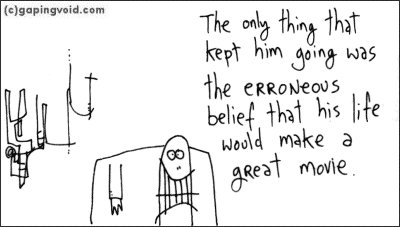The Net And The Noise
The above cartoon is from one of my favourite bloggers, Hugh MacLeod. It was the first cartoon he posted online, back in 1999, and in the years since Hugh has been one of the voices I’ve always listened to when it comes to trends in blogging and Internet use. Which is why his post today, […]

The above cartoon is from one of my favourite bloggers, Hugh MacLeod. It was the first cartoon he posted online, back in 1999, and in the years since Hugh has been one of the voices I’ve always listened to when it comes to trends in blogging and Internet use.
Which is why his post today, The Internet is ready for a new cultural shift, really caught my eye. I believe all of us who create the Internet, with our words, sounds and images, could do with stopping to consider what is has become.
“We’re sick of checking our email forty seven times a day. We’re sick of of all the endless crap we see online, the never-ending content blizzard. We’re sick of spending most of our free time staring into our phones.”
The Content Blizzard
I love the phrase “content blizzard.” It reminds us how each little piece of “content,” be it a tweet, photo or blogpost might be unique like a snowflake, but, when we take them all together, the result is an overwhelming whitewash, a blizzard so to speak.
And, it also reminds us how the word content is, itself, troubling. As the article which inspired Hugh to write (Why blog? by Dave Winer) says,
“The mission of blogging is to empower all of us to go directly to each other with our expertise. So if you know something as well as anyone else, or you learn something or know something that should be shared, then you should share it on your blog.”
But, as blogging took off, things changed. Sharing, empowering and connecting gave away to the raw game of attracting viewers for revenue. Content, as useful as a the term might be, is really a way of saying what you publish is not as important as the process of publishing, which is, of course, just a game in attracting viewers, likes and shares. And, while farming for all the traffic you should, of course, keep as much of it as you can, for yourself.
Blogging Was Once Revolutionary
As normal as this might seem to us now, I still like to think back to a time when blogging really was revolutionary. For the first time in human history you could (potentially) reach a global audience at little to no cost, without needing publishers, editors, labels, channels, networks or any other kinds of gatekeepers.
And, what did we do with this vast opportunity? We created an internet of selfies and cat videos.
Actually, what many of us did is even sillier than that. We moved our focus (and much of our work) into the more ephemeral (or as some call them, social) parts of the internet. Twitter, Facebook and the rest all have their uses. But, they are not great for the ideas and art we hope people will consider again and again, over time.
Perhaps more troubling, is the way the social web is increasingly becoming the fragmented web. Facebook users, in particular, are struggling with how the service seems to dish up less and less of what they and their followers want to see. It’s getting harder, not easier, to find new, fresh and original “content creators.”
The Internet started out as a vast, hard to navigate library. But, the library disappeared and now have a brightly lit main road, with everyone throwing rolled up pamphlets at passing cars.
Old Ideas For New Blogs
Right now I’m going back I’m going back to my oldest blogposts and even to my handwritten journals from 1999-2004, to see what ideas where driving my first experiments in this format. I believe there are some old ideas we can reapply in new ways to bring blogging back to life. As Winer says,
“Blogging needs your help. There’s cobwebs in the blogosphere. I want to dust everything off, and start linking our stuff together…”
Which is what you hopefully see happening here. One writer inspires another, who inspires another and the whole trail of inspiration is open and linked, for you to explore in your own time. That’s the way blogging used to work and, I hope, the way it might work again in the future.




